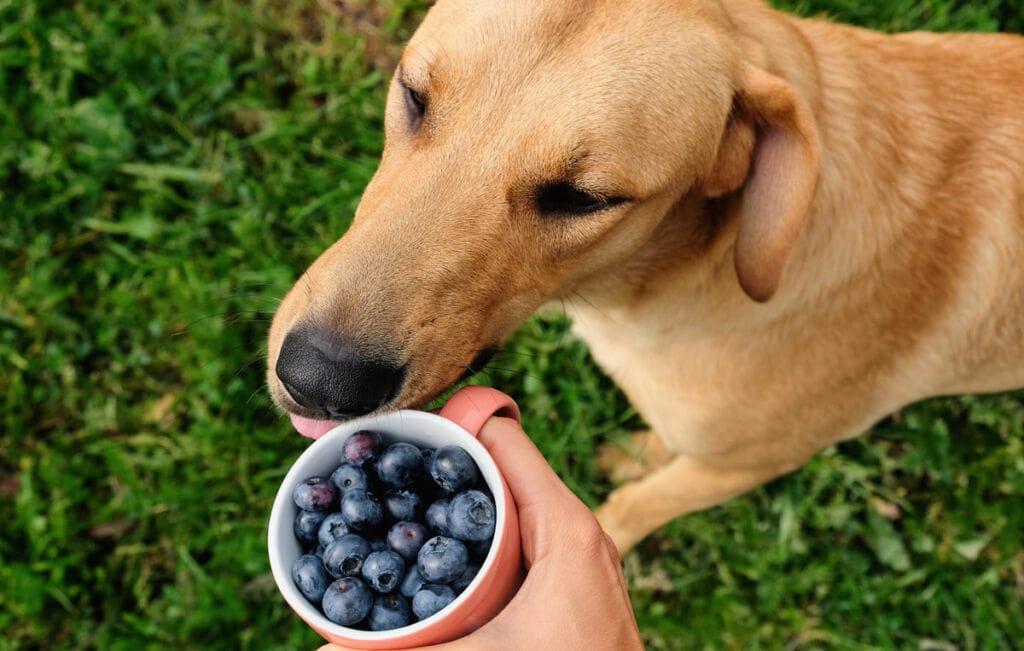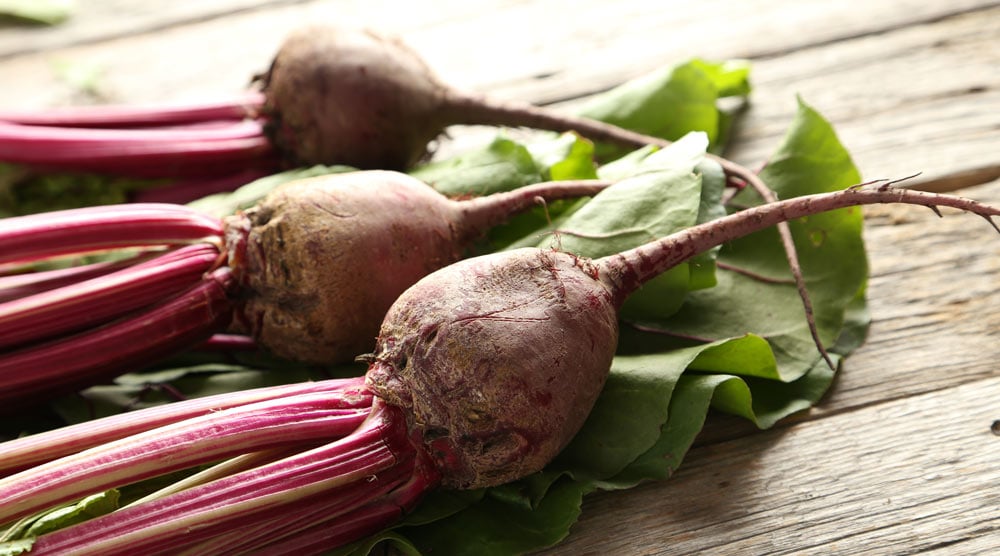Quick Answer
- Blueberries are not only safe for dogs, but are packed with beneficial nutrients.
- These low-calorie treats provide antioxidants, fiber, and essential vitamins C and K, promoting a strong immune system.
- Occasionally adding blueberries into your dog’s diet can be a delicious way to boost their well-being.
Can dogs eat blueberries? The quick answer is yes! Blueberries contain vitamins C and K, fiber, and antioxidants, making them a healthy snack for your canine companion.
Many human foods are toxic to dogs, including grapes and raisins. Fortunately, this isn’t the case for blueberries, although these berries should still only be given as an occasional treat.
Contents
Are Blueberries Good for Dogs?

A small handful of blueberries can make a great dog treat, as they are low-calorie and packed with nutrients. A single berry only contains two calories, and many dogs love eating them!
We always recommend talking with your vet before introducing a new food into your dog’s diet though. Every dog has unique dietary needs, so it’s important to check it’s a safe food for your pup.
Health Benefits of Blueberries for Dogs
Blueberries contain a range of nutrients that benefit your dog’s nutrition. These include antioxidants, vitamin C, vitamin K, and fiber. Eating foods containing these nutrients supports your dog’s immune system and health.
| Nutritional Information | Fresh Blueberries (100g) |
|---|---|
| Calories | 57 |
| Carbohydrates | 14.5 grams |
| Fat | 0.3 grams |
| Protein | 0.7 grams |
| Sugar | 10 grams |
| Fiber | 2.4 grams |
| Vitamin C | 9.5 milligrams |
| Vitamin K | 18.9 micrograms |
Antioxidants, in particular, are thought to fight free radicals which cause cell damage in dogs. For example, studies show that sled dogs supplemented with blueberries are protected against oxidative damage, meaning these berries may reduce the risk of diseases such as dementia.
Blueberries also contain phytochemicals. According to the American Institute of Cancer Research, these may be linked to a dog’s ability to fight cancer.
As a bonus, blueberries are low in calories, so your dog won’t gain weight if given them as an occasional treat.
Tip: Even dogs with pancreatitis can enjoy blueberries as an occasional treat, as they are low-fat.
Can Blueberries Be Bad for Dogs?

Blueberries are a safe dog treat but should only be given occasionally and in small amounts. Generally, treats shouldn’t make up more than 10% of your dog’s daily diet.
While blueberries are less sugary than some other fruits, they still contain 10g of sugar per 100g. This is relatively high for dogs, which is one of the reasons they should only be an occasional treat.
With any new foods, it’s important to monitor your dog closely. Start with a small amount and see how your dog reacts. Eating a few blueberries is unlikely to harm your dog, but too many could cause diarrhea – especially if your dog isn’t used to eating them.
Allergies are uncommon, but some dogs may react poorly to new types of food. If you have any concerns or worries about feeding blueberries to your dog, make sure you contact your vet.
It’s also important to know that blueberries are a potential choking hazard. Small dogs or puppies are most at risk, so it’s best to chop up blueberries for these dogs.
Other Berries Dogs Can Eat
Blueberries aren’t the only type of berry dogs can eat. Your pup can also have strawberries and blackberries. Both contain many of the same healthy vitamins and minerals – although you need to be careful not to feed too many sugary strawberries.
Make sure pits are removed from fruits that have them, such as nectarines, as these can cause choking, blockages, and may contain a chemical that turns into cyanide.
How Often Should Dogs Eat Blueberries?

Adding a few blueberries to your dog’s food is a great way to provide some extra nutrients. Aside from the nutritional benefits, many dogs also love the sugary taste of blueberries.
It’s important not to feed your dog blueberries too often though. Your pet’s regular dog food should provide a complete and balanced diet, with treats being a bonus. Blueberries are also relatively high in sugar, which can be unhealthy in large quantities.
“Many owners ask me ‘how much is too much’?” says vet Dr Linda Simon. “For toy breeds, I’d stick to just 4 or 5 berries a few times a week. Larger dogs can eat a tablespoon or two at each serving.”
How to Prepare Blueberries for Dogs
Dogs can eat fresh blueberries, as long as they are washed to remove pesticides. You don’t need to remove the skin, as this is safe for dogs to eat.
The small size means you probably don’t need to chop up blueberries when feeding big dogs. However, chopping this fruit into smaller pieces may be sensible when feeding blueberries to a puppy or mini dog breed, as this reduces the chance of choking.
You can also feed dogs frozen blueberries. These make a refreshing treat for dogs on hot days, plus the different texture keeps things interesting for your pet. Frozen blueberries are potentially more of a choking hazard though, so you should cut them up for small dogs.
Dried blueberries are safe for dogs, but only if you have dried them at home with a dehydrator. Avoid feeding your dog store-bought dried blueberries, as these often contain extra preservatives and corn syrup, which are very unhealthy for your pet.
| Type | Pros | Cons |
|---|---|---|
| Fresh | Quick to prepare, Dog receives full nutritional benefits | Must be washed |
| Frozen | Refreshing in hot weather, Different texture for dog to enjoy | Greater risk of choking in small dogs (cut them up) |
| Dried (Avoid) | Tasty as the sugar is concentrated | Store-dried blueberries contain unsafe syrup and preservatives, Higher sugar content, Difficult to chew |
| Within Dog Treats | Adds extra nutrients to treats | Treats are often higher in sugar, Less nutritional benefit |
Foods That a Dog Shouldn’t Eat
There are a variety of foods that aren’t safe for your dog, and you should be careful not to leave these lying around the house. Here are some of the most common:
- Alcohol
- Onions and Garlic
- Chocolate
- Salt in large quantities
- Tea & coffee
- Sugary foods
- Avocado
- Fatty meats such as bacon
- Dried wild seaweed
- Raw meats (such as chicken) as they can contain salmonella
- Candy (particularly those containing the sugar substitute xylitol)
- Grapes
- Raisins
“While dogs should not eat any candy, the greatest risk is from a sugar substitute called xylitol,” says vet Dr Linda Simon.
According to VCA Animal Hospitals, xylitol is highly toxic, and even relatively small amounts can lead to hypoglycemia, seizures, and even death. “In recent years, I’ve treated several dogs who’ve eaten this in protein bars and supplements, so we need to be cautious and keep all of our human snacks away from our pooches,” adds Dr Simon.
Note: This is not a complete list. If you’re not sure about the safety of a certain type of food, make sure you consult your vet before feeding it to your pet.
Frequently Asked Questions
While feeding your dog blueberries is safe, you should never give them a blueberry muffin. These cakes are packed with fat, sugar, and other unhealthy ingredients for canines. Eating a muffin could cause diarrhea, digestive problems, and even acute pancreatitis if eaten in large enough quantities.
Yes, dogs can eat frozen blueberries. These make a refreshing snack on warm days. Be aware that frozen blueberries can be a choking hazard for puppies and small dogs though. Cut them up before giving them to your dog to reduce the risk.
Grapes and raisins are highly toxic to dogs. Even as little as one raisin can cause kidney failure in a small dog, although it’s unknown exactly what triggers this reaction. Current theories include a mycotoxin found in grapes or a type of tartaric acid, but fortunately blueberries do not cause the same dangers.
Yes, you can give a puppy blueberries as an occasional snack. However, blueberries are a potential choking hazard for puppies, so be careful. You should only give your puppy a small amount of blueberries to avoid digestive problems or feeding them too much sugar.
Summary
So, what’s the final answer – can dogs eat blueberries? Yes, these berries are a healthy snack for your pooch, as long as they are given in moderation.
You should always ask your vet whether it’s safe to give your dog new food though. Every dog is different, and canine nutrition is a complex topic, so it’s essential to get professional advice when changing their diet.
You should also avoid feeding your dog too many blueberries. According to Dr Simon, a small handful a few times a week is plenty, as large quantities could cause an upset stomach or other GI problems. Treats should also never exceed 10% of your dog’s daily calorie intake.
Do you have any questions about whether dogs can eat blueberries? Let us know in the comments section.



![Can Dogs Eat Starburst? [Quick Answer]](https://www.thedogclinic.com/wp-content/uploads/2022/09/featured-image-can-dogs-eat-starburst-1.jpg)

Dogs, in a manner similar to humans and other animals vary in capacity to tolerate certain substances. One dog (or human) may be allergic to nuts, while most others are not. Acorns contain a similar allergen to that of nuts, therefore some dogs will be allergic, but not the majority of them.
Known substances to avoid with canines would include grapes and grape products (raisins, etc), and chocolates. Fatalities due to renal failure has occurred too frequently with those products to risk giving them to man’s best friend..
As with most things in life, it is always best to check when there is a question. Enjoy your dog and try to keep him/her healthy!
Thank you. Thank you. Thank you. I have searched and searched the web for an answer to my question What foods can dogs NOT have. Finally, you give a list of the most dangerous. That’s all I wanted. Thank you.
Shouldn’t grapes and raisins be included in the list of things not to give to dogs?
I always thought a lot of berries were bad for dogs thanks for the info!
I have a 18 and a half year old Doxie. Loves to eat, but of course gains weight, I also have a very busy a schuedule, taking care of a very ill daughter (8) years now with Lyme disease and a disabled veteran husband.
What can I make ( that’s simple) to give my dog, treats to keep his weight down.?
Simple and healthy, maybe even some suggestions on foods that can help him lose weight.
Much appreciate any info
Gail
i would love some recipes.. i have been making dog food for a yr for a rescue dog and he is happy with that
brown rice
cauliflower/brocolli/beans/carrots
turkey
a protien power from a pet shop, seems to have many vitamins – not thrilled with smell
would love more suggestions… our dog did not want to eat commercial brands no matter what i fed him
thank you
How do I get my dog to lose weight? He’s a 9 year old golden retriever and weighs around 95 lbs.
Thank you! This was very helpful. It’s good to know I’m not poisoning my lil buddy. I have been feeding my lil pompom blueberries since he was a small pup. I only give him about 6 berries every now and then. He loves them. Thanks again!